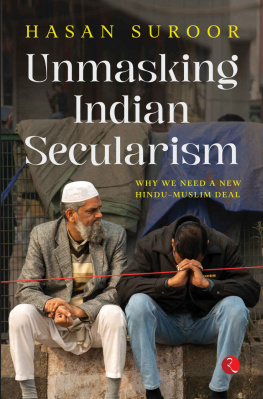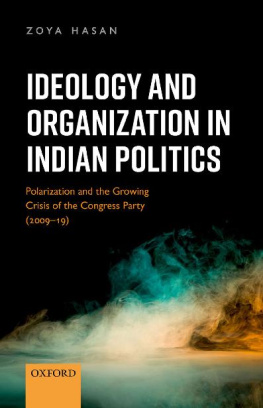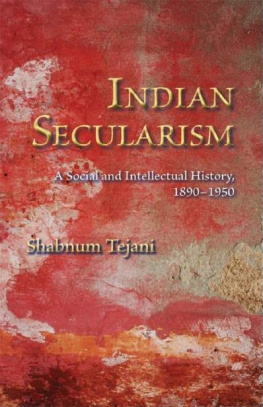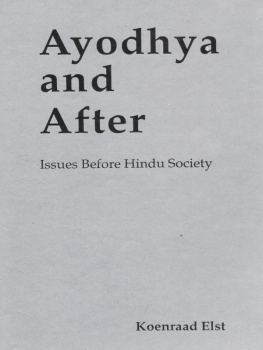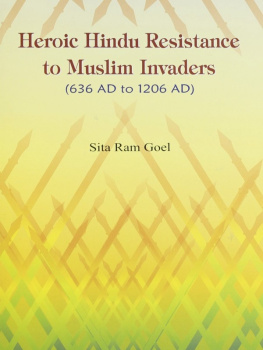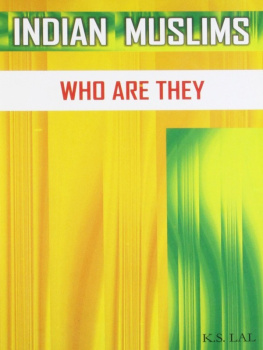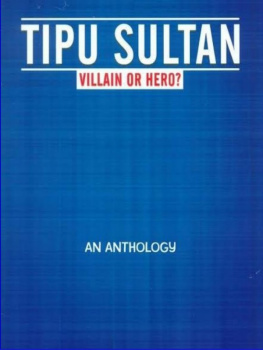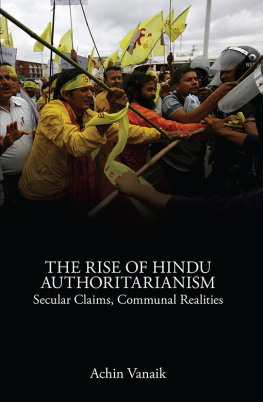Hasan Suroor - UNMASKING INDIAN SECULARISM: Why We Need a New Hindu-Muslim Deal
Here you can read online Hasan Suroor - UNMASKING INDIAN SECULARISM: Why We Need a New Hindu-Muslim Deal full text of the book (entire story) in english for free. Download pdf and epub, get meaning, cover and reviews about this ebook. year: 2022, publisher: Rupa Publications, genre: Politics. Description of the work, (preface) as well as reviews are available. Best literature library LitArk.com created for fans of good reading and offers a wide selection of genres:
Romance novel
Science fiction
Adventure
Detective
Science
History
Home and family
Prose
Art
Politics
Computer
Non-fiction
Religion
Business
Children
Humor
Choose a favorite category and find really read worthwhile books. Enjoy immersion in the world of imagination, feel the emotions of the characters or learn something new for yourself, make an fascinating discovery.
- Book:UNMASKING INDIAN SECULARISM: Why We Need a New Hindu-Muslim Deal
- Author:
- Publisher:Rupa Publications
- Genre:
- Year:2022
- Rating:4 / 5
- Favourites:Add to favourites
- Your mark:
- 80
- 1
- 2
- 3
- 4
- 5
UNMASKING INDIAN SECULARISM: Why We Need a New Hindu-Muslim Deal: summary, description and annotation
We offer to read an annotation, description, summary or preface (depends on what the author of the book "UNMASKING INDIAN SECULARISM: Why We Need a New Hindu-Muslim Deal" wrote himself). If you haven't found the necessary information about the book — write in the comments, we will try to find it.
UNMASKING INDIAN SECULARISM: Why We Need a New Hindu-Muslim Deal — read online for free the complete book (whole text) full work
Below is the text of the book, divided by pages. System saving the place of the last page read, allows you to conveniently read the book "UNMASKING INDIAN SECULARISM: Why We Need a New Hindu-Muslim Deal" online for free, without having to search again every time where you left off. Put a bookmark, and you can go to the page where you finished reading at any time.
Font size:
Interval:
Bookmark:


Published by
Rupa Publications India Pvt. Ltd 2022
7/16, Ansari Road, Daryaganj
New Delhi 110002
Copyright Hasan Suroor 2022
All rights reserved.
No part of this publication may be reproduced, transmitted, or stored in a retrieval system, in any form or by any means, electronic, mechanical, photocopying, recording or otherwise, without the prior permission of the publisher.
The views and opinions expressed in this book are the authors own and the facts are as reported by him which have been verified to the extent possible, and the publishers are not in any way liable for the same.
ISBN: 978-93-5520-406-6
First impression 2022
10 9 8 7 6 5 4 3 2 1
The moral right of the author has been asserted.
This book is sold subject to the condition that it shall not, by way of trade or otherwise, be lent, resold, hired out, or otherwise circulated, without the publishers prior consent, in any form of binding or cover other than that in which it is published.
For all those fellow Indians who value Indianness more than Hinduness or Muslimnesssadly, a shrinking tribe.

Watching the unravelling of Indian secularism, I am reminded of the popular Urdu poet and film lyricist Sahir Ludhianvis famous line, Woh afsana jise anjaam tak laana na ho mumkin us-e ek khubsoorat mor de kar chodna achha [When its not possible to take a story to the desired conclusion, its better to give it a dignified turn and end it]. He was, of course, writing about unrequited love, how to get over it and move on.
But it is an equally apt prescription for the troubled afsana (tale) of our experiment with secularism which seemed like a good idea after the traumatic events of Partition, but 70 years on, it has come under sharp scrutiny amid widespread disillusionment with the way it has been practised over the years.
This book is a critical examination of the history of Indias post-Independence secular politics, including the somewhat controversial rationale of the Congress party behind choosing secularism as state policy. Whether a western concept of religious neutrality was suited to a historically deeply religious society has been a legitimate matter of concern. It has been said that it was destined to fail. Was the idea of declaring India a secular state really borne out of Nehrus innate liberalism? Alternatively, was it intended to score a political point over Hindu nationalists and the All-India Muslim League: an attempt by the Congress party to shame Mohammed Ali Jinnah, the founder of Pakistan, even as it laid foundations of a minority vote bank?
Meanwhile, instead of contributing to fostering communal harmony, as was intended, secularism has become a source of division, breeding resentment among the majority community that believes that it is disproportionately weighted in favour of minorities, especially Muslims. The incumbent Bharatiya Janata Party (BJP) and its allies, riding the current wave of Hindu nationalism, accuse secularists of minority appeasement and peddling pseudo-secularism for electoral gains.
Muslims and other minorities have their own reasons to be suspicious of the secular establishment. Far from benefiting from secularism, the minorities claim that their grievances and frustrations have been manipulated by the Congress party and other Centre-Left groups, and they have been used as proxies in the battles against Right-wing political rivals. Muslims are particularly angry, and their emphatic rejection of the Congress party underlines the strength of their dissatisfaction and resentment. Their withdrawal of support has been an existential blow to the Congress party, plunging it into terminal decline, which shows how reliant it had been on Muslim votes and lends credence to claims that it was simply interested in secularism as a route to building a Muslim vote bankpresenting itself as their saviour against communal Hindu groups.
The story of Indian secularism is a classic example of good intentions being derailed by misguided practices. Over the years, there has been enough post-mortem on why secularism has not worked and whos to blame. But we are where we are, and frankly, it makes no sense endlessly debating it. That will only generate more acrimony leading to more polatization. The effort now should be to ponder ways to find a way out of the mess. My aim here is to start a candid conversation about where we go from here.
It will not be easy, particularly for Muslims who might be required to make some hard choices in pursuit of an end to the insecurity and uncertainty they face about their future in India. More broadly, it will involve acknowledging certain facts that liberals may not find palatable: our historic failure to deliver on the promise of secularism and a profound change in Hindu public opinion, which, in recent years, has swung towards majoritarianism with the idea that Hindus have the first right over India becoming deeply ingrained, even among many liberals. Any sustainable solution will have to be within the context of these realities.
This is not a plea to abandon secularism altogether or suddenly embrace a theocratic Hindu state, but to look for a model that is more effectively in tune with contemporary political and social realities, and the current national mooda settlement underpinned by realism rather than idealism. The effort should be to try and strike a balance between minority rights and the majority communitys sensitivities, which it believes have been ignored in the name of secularism. The Hindu sense of grievancereal or imaginarywill have to be addressed in the larger interest of Indias unity.
Theres a mistaken notion that the only alternative to a secular state is a theocracy. I argue that a state can have an officially recognized religionin Indias case, it will be Hinduismand yet remain secular in practice by treating all citizens as equal and making sure that their religious and civil rights are protected by law, as in many western liberal democracies, including Britain where the state is Christian, but government practices are secular. There exists a robust and strictly enforced equality law that ensures that nobody is discriminated against on the basis of their religion or ethnicity.
We can find successful examples of the British model or its variations in other countries across South Asia and the Muslim world. The book examines these models and argues that it would be a good starting point to study them as the basis for a new constitutional framework that would be seen to be fair to everyone without abandoning the essential elements of a secular society.
No debate on HinduMuslim relations would be complete without a reference to the role of nationalism in muddying the waters. The term nationalism is tossed around a great deal these days and is considered a virtue and a badge of honour, but I trace the history of competing Hindu and Muslim cultural nationalisms to show how they have been used to divide people. Partition was a result of the clash between rival nationalisms, peddled by the Muslim League on the one hand and the Hindu Mahasabha and its allies on the other, both feeding on each other. I argue, on the basis of historical evidence, that both sides believed in the two-nation theory, namely, Muslims and Hindus represented two separate civilizations and cultures, and never the twain shall meet. I explore how this worked on the ground with the Hindu Mahasabha actually collaborating with the Muslim League in opposing the Congress party even as the League campaigned for a separate Muslim homeland.
Font size:
Interval:
Bookmark:
Similar books «UNMASKING INDIAN SECULARISM: Why We Need a New Hindu-Muslim Deal»
Look at similar books to UNMASKING INDIAN SECULARISM: Why We Need a New Hindu-Muslim Deal. We have selected literature similar in name and meaning in the hope of providing readers with more options to find new, interesting, not yet read works.
Discussion, reviews of the book UNMASKING INDIAN SECULARISM: Why We Need a New Hindu-Muslim Deal and just readers' own opinions. Leave your comments, write what you think about the work, its meaning or the main characters. Specify what exactly you liked and what you didn't like, and why you think so.

